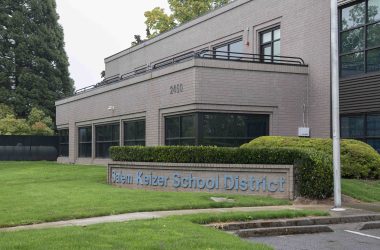Ranae Quiring hasn’t had a single student bump into her this fall.
The McKay High School principal is used to dodging teenagers who have their faces buried in their phones during passing periods.
“Usually in the first four weeks it’s 10 times a week,” she said.
This school year, for the first time, McKay staff have been enforcing a cellphone ban from the time classes begin until the final bell at 3:20 p.m.
It’s not perfect — a recent visit during lunch showed a scattering of students listening to music or texting in the hall. But Quiring said the effects have been visible. Students are engaging more in class and have longer attention spans.
“They actually are learning how to have conversations,” she said.
Share your thoughts on phone bans
Are you a student, parent or educator at one of the schools trying cellphone pouches? Salem Reporter wants to hear your questions and thoughts about this change. Email Rachel Alexander at [email protected].

The early success is one reason why she wanted McKay to try out new pouches that will lock up student phones during the day.
Six Salem-Keizer School District middle and high schools are rolling out Yondr phone pouches between November and January. The company has gained traction across the U.S. with its soft, portable pouches, which are issued to students and can be locked via a magnetic base as students enter school for the day.
The district has ordered about 8,100 pouches to roll out the program at McKay and Sprague high schools, and Houck, Stephens, Straub and Whiteaker middle schools.
The cost, about $213,000, will be covered through the district’s share of state money from the student investment account, intended to help improve students’ sense of belonging at schools, said district spokeswoman Emily Reverman.
District leaders announced the rollout of pouches Wednesday in emails to employees and families at the six schools adopting them.
A growing challenge for schools
The pouches are the latest effort to address a host of problems educators say are associated with increased student cellphone use at school in recent years.
When classes moved online during Covid, technology became a larger part of students’ school days. Many students who were socially isolated at home got used to spending most of the day on their phones.
As students returned to school, educators tried to adapt to having laptops and phones in class. At McKay, which has about 2,500 students, Quiring said the school set an expectation that phones would only be out in class for educational use.
In practice, she said they found it was difficult to monitor and created extra work for teachers already stretched thin.
“It became a behavior issue,” she said.

Fights at school were commonly caused by conflicts that occurred over text and social media, Quiring said. Since they began enforcing a ban this year, she said fights have decreased significantly.
District leaders in the summer of 2022 issued a policy banning phones during class time for all middle and high school students.
In practice, enforcement has varied from school to school, with many setting stricter limits in the years since the return from Covid.
At Straub Middle School in West Salem, Principal Denny McCarthy said the school has been gradually restricting phone use. When schools first returned from Covid, they allowed phones before school and during lunch.
“It turned into power struggles in the classroom,” he said. Students would refuse to give up phones when asked, prompting fights.
“The cafeteria was silent,” he said. “In middle school, if lunch isn’t loud, something’s wrong.”
With a more strict phone ban this year, he said Straub’s lunchroom is appropriately noisy again.
Like Quiring, he volunteered to have Straub test pouches as soon as district leaders asked principals for volunteers.
Teaching phone moderation
When pouches roll out in schools, students will be issued one to keep with them.
They’ll be expected to put their phone in it and lock the pouch using one of the magnetic bases available near school entrances, only unlocking it at the end of the day.
Students who need to have a phone accessible because of a disability or medical accommodation, like diabetic students who use phones for insulin monitoring, will get a pouch that looks the same as others, but can open via Velcro so they can access their phone.
And Quiring said students who might temporarily need quick access to a phone, like those with a parent in the hospital, can speak to school office staff about temporarily having a pouch that opens.

Both principals said part of their job as educators is to teach students to set limits around phone use, and help address the rise in mental health issues among young people which a growing body of research has linked to phone and social media use.
The same standards should apply to school employees, they said.
McCarthy said last week, he pulled his phone out of his pocket during lunch at Straub after hearing a notification chime.
Though he thought he was being “sneaky,” he said a student caught him.
“So I said, ‘Well, you need to take that up to the office. I’ll have to pick it up after school,’” McCarthy said. He handed his phone over to the middle schooler.
“It was really so they could see that we have the same values, where it’s just not for you guys, it’s for all of us. And it was fun. They felt really empowered,” he said.
Danielle Neves, assistant superintendent for secondary schools, said the pouches are intended to help reduce anxiety that students will miss out on conversations by being off their phone during the school day.
“If no one has access to their phones and no one has access to their social media, then students are able to lower that filter and really engage,” she said.
Middle and high schools around the district will be looking at policies and practices to limit phone use. That could include expanding pouches to other schools depending on feedback from the six adopting them first and interest from other school leaders.
“We definitely district-wide will be taking steps to reduce the distraction that cell phones and social media are creating in our schools,” Neves said.
Security and school safety
Principals said they understand why families might be concerned about not being able to reach students immediately in case of an emergency.
But both Quiring and McCarthy said their schools have had to slow down law enforcement investigations into school threats because hundreds of students being on their phones prompted unfounded rumors and mass panic.
In 2021, McKay students barricaded themselves in classrooms following a report of a student with a gun on campus. Police responded and never found a gun in the school.
Students took video on their phones of armed police running into the school and shared it with families and on social media, prompting hundreds of parents to arrive at the school to try to pick their children up while school employees were still working with police to ensure the building was safe, Quiring said.
McKay had another lockdown this fall, again prompted by a report of a student with a gun. Quiring said with fewer student phones out, school staff spent less time combatting inaccurate rumors and could focus on clearing the building quickly, resulting in a much shorter lockdown.
“It allowed us to get the accurate information out in a much faster manner, and we didn’t have … an issue for police to get here around parent cars,” she said.
Parents can still call the school if they need to reach students urgently, Quiring said, and classrooms have landlines.
And in a true emergency, Yondr pouches, while sealed, are made of fabric and are “not indestructible,” said Reverman.
Contact reporter Rachel Alexander: [email protected] or 503-575-1241.
A MOMENT MORE, PLEASE– If you found this story useful, consider subscribing to Salem Reporter if you don’t already. Work such as this, done by local professionals, depends on community support from subscribers. Please take a moment and sign up now – easy and secure: SUBSCRIBE.

Rachel Alexander is Salem Reporter’s managing editor. She joined Salem Reporter when it was founded in 2018 and covers city news, education, nonprofits and a little bit of everything else. She’s been a journalist in Oregon and Washington for a decade. Outside of work, she’s a skater and board member with Salem’s Cherry City Roller Derby and can often be found with her nose buried in a book.









